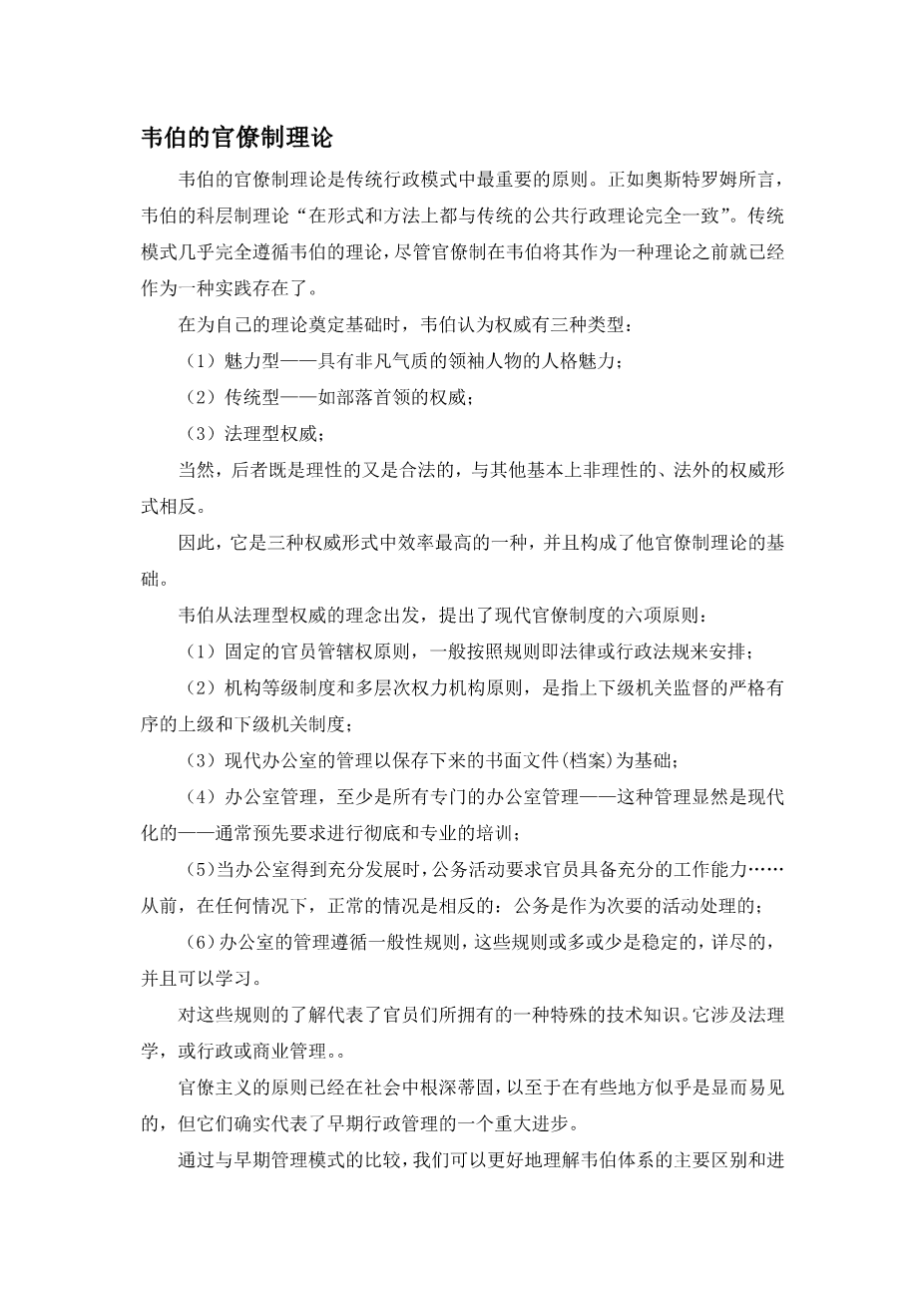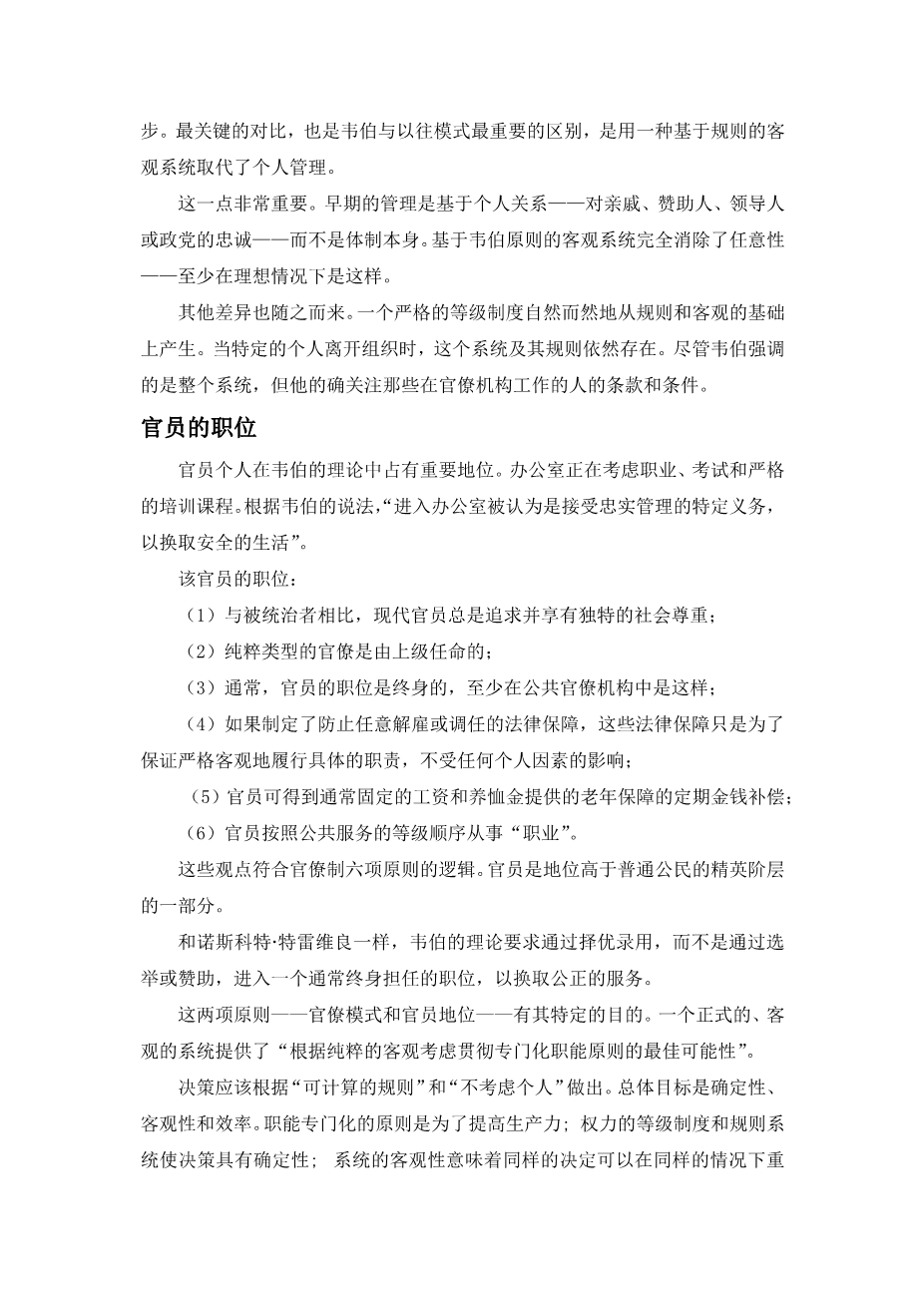韦伯的官僚理论外文翻译资料
2022-08-05 14:10:03
Weberrsquo;s theory of bureaucracy
The most important principle of the traditional model of administration is Weberrsquo;s theory of bureaucracy. As Ostrom argues, Weberrsquo;s theory of bureaucracy lsquo;was fully congruent with the traditional theory of public administration in both form and methodrsquo;. The traditional model followed Weberrsquo;s theory virtually to the letter, although bureaucracy existed as a practice prior to Weber setting it out as a theory.
In setting out a basis for his theory, Weber argued there were three types of authority:
1) the charismatic—the appeal of an extra-ordinary leader;
2) the traditional—such as the authority of a tribal chief;
3) rational/legal authority.
The latter was both rational and legal, naturally, as opposed to the other forms of authority that were essentially irrational and extra-legal.
Therefore, it was the most efficient of the three forms of authority and formed the basis for his theory of bureaucracy.
Weber set out six principles for modern systems of bureaucracy, deriving from the idea of rational-legal authority:
1) The principles of fixed and official jurisdictional areas, which are generally ordered by rules, that is by laws or administrative regulations;
2) The principles of office hierarchy and of levels of graded authority mean a firmly ordered system of super- and sub-ordination in which there is a supervision of the lower offices by the higher ones;
3) The management of the modern office is based upon written documents (lsquo;the filersquo;) which are preserved;
4) Office management, at least all specialized office management—and such management is distinctly modern—usually pre-supposes thorough and expert training;
5) When the office is fully developed, official activity demands the full working capacity of the officialhellip;Formerly, in all cases, the nor-mal state of affairs was reversed: official business was discharged as a secondary activity;
6) The management of the office follows general rules, which are more or less stable, exhaustive, and which can be learned.
Knowledge of these rules represents a special technical learning which the officials possess. It involves jurisprudence, or administrative or business management.
The principles of bureaucracy have become so ingrained in society that there points seem obvious, but they did represent a substantial advance on early administration.
The main differences and advances of the Weberian system are best understood by comparison with earlier models of administration. The key contrast, the most important difference between Weber and previous models, is the replacement of personal administration with an impersonal system based on rules.
This is a very important point. Earlier administration was based on personal relationships—loyalty to a relative, patron, leader or party—and not to the system itself. An impersonal system based on Weberrsquo;s principles removes arbitrariness completely—at least it does in the ideal case.
Other differences follow. A rigid system of hierarchy follows naturally from the basis in rules and impersonality. The system and its rules persist when particular individuals have left the organization. Though Weberrsquo;s emphasis is on the system as a whole, he did pay attention to the terms and conditions of those who work in the bureaucracy.
The position of the official
The individual official occupies a key place in Weberrsquo;s theory. Office holding is considering a vocation, following examination and a rigorous course of training. According to Weber, lsquo;entrance into an office is considered an acceptance of a specific obligation of faithful management in return for a secure existencersquo;.
The position of the official:
1) The modern official always strives for and usually enjoys a distinct social esteem as compared with the governed;
2) The pure type of bureaucratic official is appointed by a superior authority;
3) Normally, the position of the official is held for life, at least in public bureaucracies;
4) Where legal guarantees against arbitrary dismissal or transfer are developed, they merely serve to guarantee a strictly objective discharge of specific office duties free from all personal considerations;
5) The official receives the regular pecuniary compensation of a normally fixed salary and the old age security provided by a pension;
6) The official is set for a lsquo;careerrsquo; within the hierarchical order of the public service.
These points follow logically from the six principles of bureaucracy. The official is to be part of an elite with status higher than that of ordinary citizens.
Along with Northcote-Trevelyan, Weberrsquo;s theory required recruitment by merit, not by election or by patronage, into a position normally held for life in exchange for impartial service.
The two principles—the model of bureaucracy and position of the official—had specific purpose. A formal, impersonal system offers lsquo;the optimum possibility for carrying through the principle of specializing functions according to purely objective considerationsrsquo;.
Decisions would and should be made according to lsquo;calculable rulesrsquo; and lsquo;without regard for personsrsquo;. The general aims were certainty, impersonality and efficiency. The principles of specialization of
剩余内容已隐藏,支付完成后下载完整资料


英语译文共 4 页,剩余内容已隐藏,支付完成后下载完整资料
资料编号:[262140],资料为PDF文档或Word文档,PDF文档可免费转换为Word
您需要先支付 20元 才能查看全部内容!立即支付




